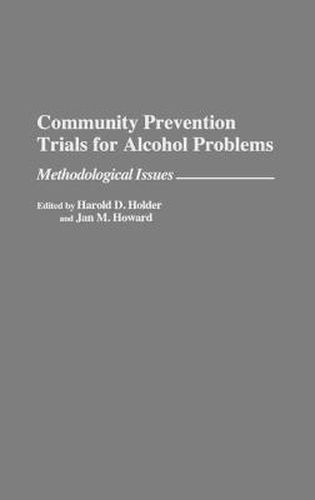Readings Newsletter
Become a Readings Member to make your shopping experience even easier.
Sign in or sign up for free!
You’re not far away from qualifying for FREE standard shipping within Australia
You’ve qualified for FREE standard shipping within Australia
The cart is loading…






The contributors to this volume aim to demonstrate that it is now possible to undertake community prevention trials of alcohol-involved problems with the same precision, good design and careful planning that has characterised similar prevention trials for heart disease and cancer prevention. This is the first book to establish a scientific basis for the integration of research into programme design and in programme evaluation, making it possible to determine if community programmes are effective or worth the money spent on them. In part one, the contributors address issues of outcome measures, selection of relevant community interventions, utilisation of appropriate research designs and analyses, and adjustment to social and political realities. Part two reviews definitions, perspectives, and issues that provide a conceptual base for the rest of the book. Also considered are the selection and measurement of alcohol problems that may be candidate outcome variables for a community intervention study. Part three summarises the perspectives and prior experiences of community-based approaches in other health areas (including heart disease, cancer and adolescent health) that may be applicable to the prevention of alcohol-related problems. Experiences and implications of alcohol-prevention projects in Ontario, Texas, and Rhode Island are discussed in part four. Part five evaluates different experimental designs, methodologies, and relative risk regression models of community-based intervention programmes in alcohol prevention. The two chapters in part six discuss the dynamic social and political realities facing community prevention trials for alcohol problems and guidelines for undertaking such trials. This book should be useful for state and local prevention programme planners and evaluators, researchers in alcohol and substance abuse, teachers of applied research methods or social programme development and planning, and government policy makers.
$9.00 standard shipping within Australia
FREE standard shipping within Australia for orders over $100.00
Express & International shipping calculated at checkout
The contributors to this volume aim to demonstrate that it is now possible to undertake community prevention trials of alcohol-involved problems with the same precision, good design and careful planning that has characterised similar prevention trials for heart disease and cancer prevention. This is the first book to establish a scientific basis for the integration of research into programme design and in programme evaluation, making it possible to determine if community programmes are effective or worth the money spent on them. In part one, the contributors address issues of outcome measures, selection of relevant community interventions, utilisation of appropriate research designs and analyses, and adjustment to social and political realities. Part two reviews definitions, perspectives, and issues that provide a conceptual base for the rest of the book. Also considered are the selection and measurement of alcohol problems that may be candidate outcome variables for a community intervention study. Part three summarises the perspectives and prior experiences of community-based approaches in other health areas (including heart disease, cancer and adolescent health) that may be applicable to the prevention of alcohol-related problems. Experiences and implications of alcohol-prevention projects in Ontario, Texas, and Rhode Island are discussed in part four. Part five evaluates different experimental designs, methodologies, and relative risk regression models of community-based intervention programmes in alcohol prevention. The two chapters in part six discuss the dynamic social and political realities facing community prevention trials for alcohol problems and guidelines for undertaking such trials. This book should be useful for state and local prevention programme planners and evaluators, researchers in alcohol and substance abuse, teachers of applied research methods or social programme development and planning, and government policy makers.